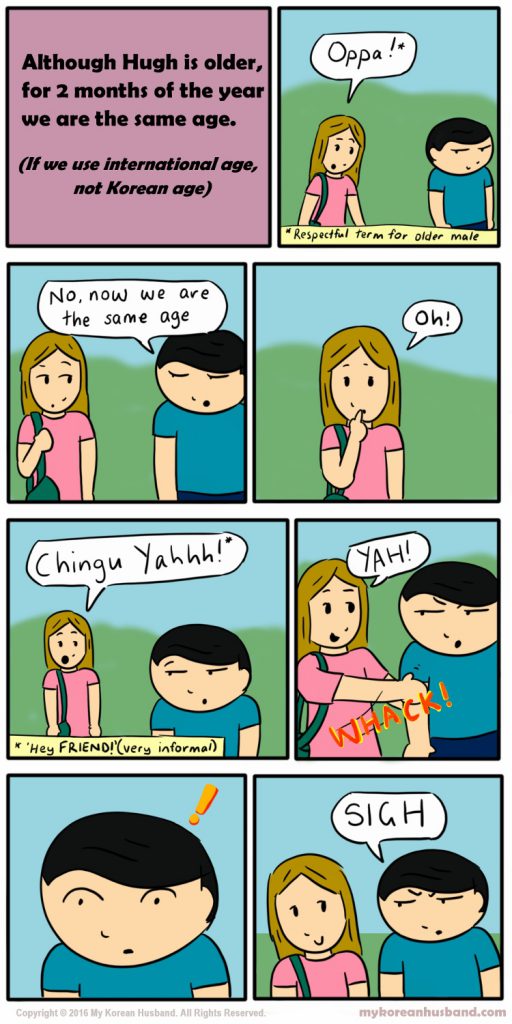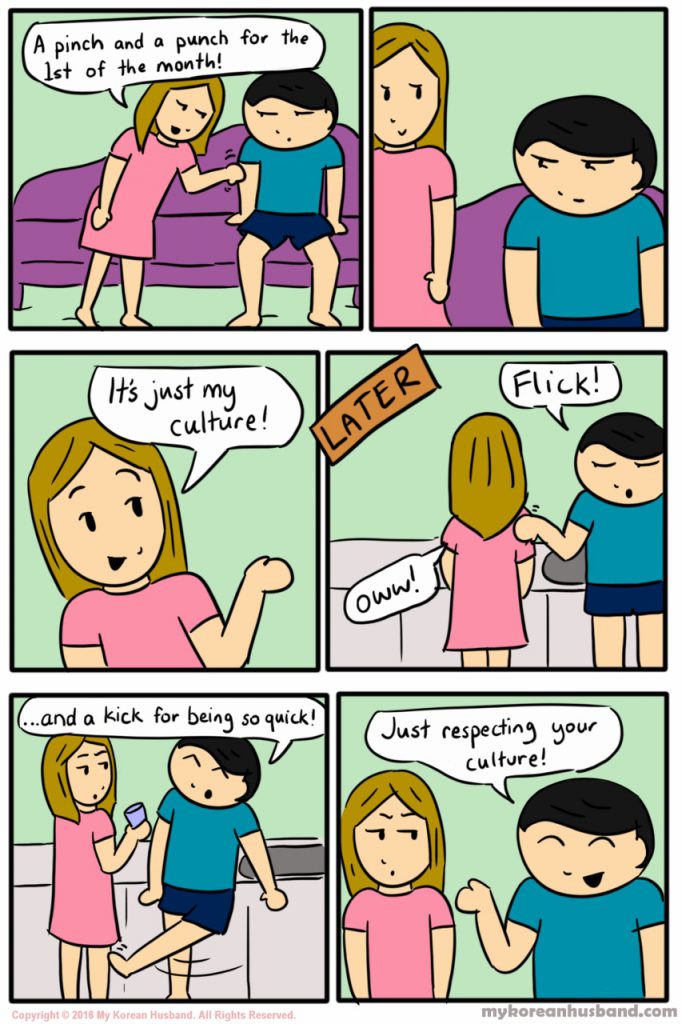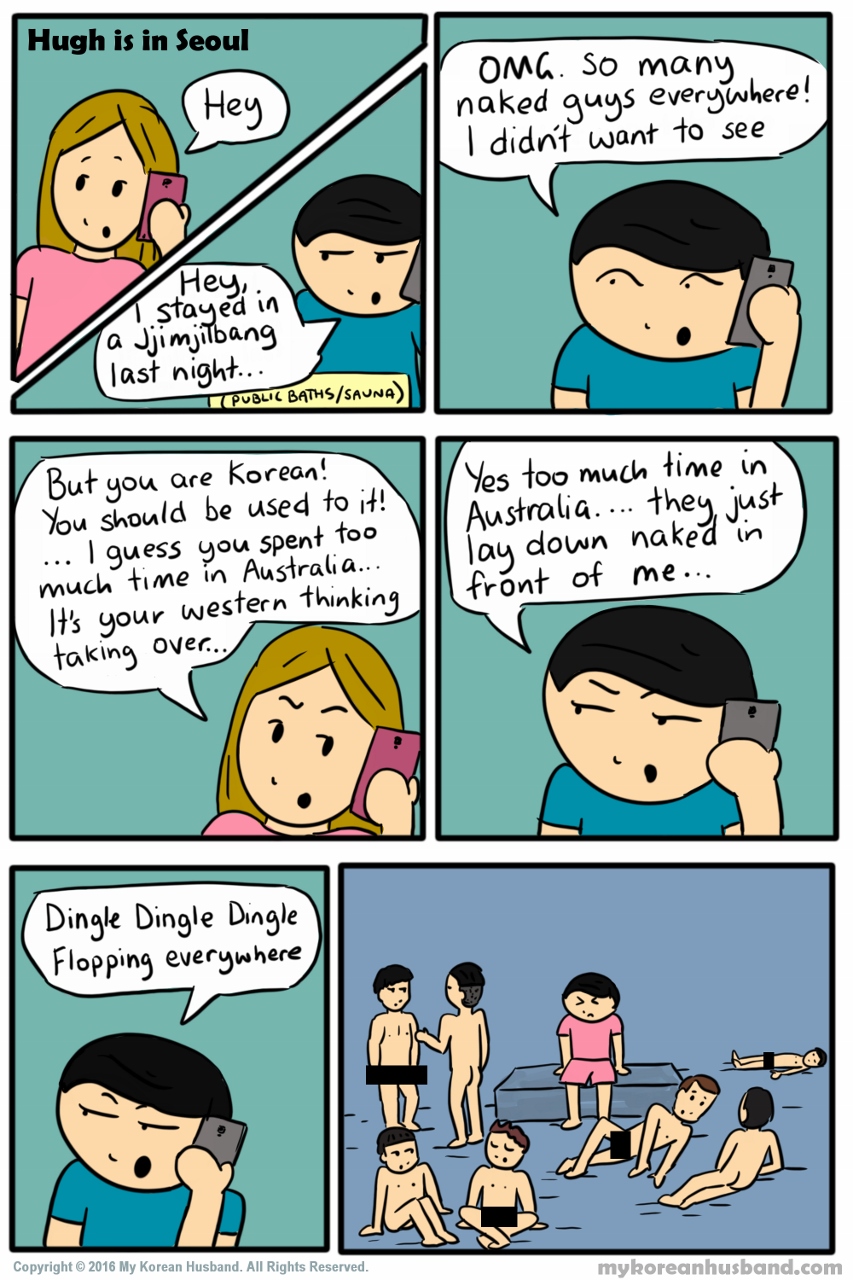We try to focus on positive stuff but after being online for several years we thought we’d talk about some of the weird or mean comments we sometimes get, as well as what some people say in real life. We also wanted to give a space to other international/interracial married couples to talk about their experiences too. People usually comment more on YouTube to head over there to join the discussion.
Category: Culture (Page 4 of 24)
Traditional and modern Korean culture.

If you are completely unfamiliar with Korean culture and respectful terms, this comic might be a little bit difficult to understand.
The longer we’ve been back in Korean culture, the more Hugh likes being called “Oppa”. Since it was my birthday recently, my age “caught up” to his. This doesn’t happen in Korean age because everyone’s age goes up at the same time at the start of the year. But in international age there are a few months where our ages are the same. Hugh pointed this out. In Korea if someone is the same age as you it means you are friends in the sense that neither person needs to use a respectful name for the other, because neither is older than the other. It allows for much more relaxed speech and manners usually.
So I took the opportunity to act like a “chingu” instead of a “dongseng” (the younger one in the relationship). Used to be an “oppa”, Hugh suddenly realised he had made a terrible mistake…
In English I am very free and comfortable and can tease him with no problems. But in Korean, in a Korean setting he suddenly realised how different it was if he wasn’t my Oppa anymore. Especially because I used the opportunity to be rude.
Hugh says: I was saying, “You are the same as my age now! Hahaha!” And making fun, but actually it’s not good for me. I still like to be called Oppa.
We get a lot of messages where people need advice and we do out best to answer them. We decided it was time to make a video talking about how we make our marriage work and what things we do to make a happy life together. The video was actually over 30 mins long but of course cut down, so there was many more things we had to say!
We wrote down what we wanted to say, but I ended up doing more of the talking because Hugh isn’t as comfortable in English for a more scripted video BUT if you get him in person he will talk your ear off!

I shouldn’t have taught him the response, or I should have said “no returns”. I know there are variations of this too. Do people do it where you live? Or is there something else people do on the first of the month? I think where I grew up people sometimes responded with a “pinch and a kick for being so quick” too.
He actually did this to me hours later… I might go flick him in the forehead to respect his Korean culture…
Have you ever visited another country and discovered people weren’t following etiquette rules like you thought?
While it’s always important to have some awareness of etiquette while visiting another country, lists online can be overwhelming and anxiety inducing. We talk about some Korean etiquette found online and if it’s vital to follow it or not. We actually talked about a bunch more etiquette but had to cut out a lot. We just wanted to reassure people, especially those who suffer anxiety, to not worry too much.
About 2 weeks ago we traveled to the area where Hugh’s mother is from and where Hugh spend a large amount of his childhood. It has been many years since they had been back. We visited his grandparents’ burial mounds and paid respects, we also saw many elderly relatives and found the house that Hugh lived in as a small boy.
When Hugh was only about 1 year old, his father became very ill and he had to go live with his grandparents as his mother spent all her time looking after his father. It’s not unusual for children to live with grandparents in Korea, either back then or today. You still see grandparents doing a lot of the child minding in Korea and sometimes children live with their grandparents for years like Hugh did. It was very strange for him to see that area again. He was close to his grandparents and grew up thinking they were his real parents, so the transition of moving back with his parents was difficult for him. His grandfather passed away when he was quite young and his grandmother passed away while he was doing his military service.
Korea has had such rapid development in the past few decades, so it’s interesting to think about what Hugh’s childhood was like in the 1980’s and how it differed from mine in Australia.

If you are unsure of what a Jjimjilbang is, click here.
When you are in an intercultural marriage, you can’t always pick and choose what aspects from our own culture your partner adopts. I don’t particularly like that Hugh has picked up this Australian aversion to communal male nudity but that’s how he feels after living in Australia. I don’t like the narrow idea of masculinity in Australia and find a lot of things in Korea to be refreshing. But I guess when something is an aversion, it’s easy for others to absorb that thinking too, and Hugh changed a lot in his time in Australia. He very easily slips into a more Australian/western way of thinking sometimes.
Although he grew up going to jjimjilbangs in Korea and being naked with his friends was completely normal, he now feels odd because of reverse culture shock. I wonder if a few more years back in Korea will change that. If not, perhaps he should spend some time in European countries with naked saunas so he can get over it haha.
“Dingle Dingle Dingle” was the best way he could explain what he was seeing in English.

Recent Comments